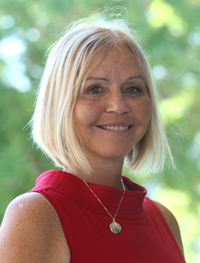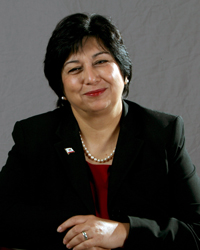Power Up Program
Ensuring Student Success in Online Learning
When students prepare for a new school year, they usually make sure that they have paper, pens, pencils and books for that first day when they walk into class. But these days, many students are taking online courses — so what do they need?
 Caption: Lynda RandallDownload Photo
Caption: Lynda RandallDownload Photo
Lynda E. Randall, professor of secondary education, and Elahe Amani, director of technology services for student affairs, have been exploring that arena and as a result, are developing a series of programs to help students prepare for and succeed in online courses. Also supporting in the project are Shariq Ahmed of Information Technology and David Sanchez of Distance Nursing.
“Ten years ago, online was basically, voice-over PowerPoint presentations, televised class sessions or very simple content,” said Amani. “Now with new technology, its so interactive. It’s wonderful, and faculty are interested in using a wide range of technology — but are students ready for it?”
Keeping students on track by averting technical difficulties from the outset is key, according to Randall.
“It’s difficult for a student to get the most out of an online course if they struggle with the technology,” explained Randall, who has taught online courses for several years. “I’ve had students in the middle of the course tell me that they can’t open the videos or have some other difficulty that can be solved with configuring their browsers or getting the right software for the course needs. Without assistance, they can quickly be overwhelmed and be discouraged because they are technically far behind in the course. It can have consequences for their well-being.
“We want to provide support so that students and faculty members are not bogged down with the technical aspects of online courses and can focus on the academics,” said Randall. “Many online graduate programs have incorporated boot camps and we’re offering a similar program to students taking individual courses. We’d also like to connect with certain student populations, such as re-entry students and veterans, to help meet their needs.”
 Caption: Elahe AmaniDownload Photo
Caption: Elahe AmaniDownload Photo
Using a $24,000 University Mission and Goals Initiative, the pair is tackling the problem with a wide range of tactics:
- pre-assessment of student readiness;
- boot camps to help students configure their computers and software for their courses;
- a website with training modules so that students can learn what to expect in online courses, how to communicate with the faculty and their peers, and more about study skills, time management and guidelines for success in online learning; and
- a blog where students can talk to each other and to Randall and Amani about their experiences.
“We’ll be using Smarter Measure, an online assessment program that tests students for reading and technical proficiency, learning style and time management skills,” said Randall. “Students take the assessment and attend the boot camp prior to the beginning of the semester, so that they can jump right into the course work prepared. The online modules will be available for students to use any time that they need them, and we’re hoping to provide links to other information that is available.”
“This is a win-win for both faculty members and students,” added Randall. “Faculty can focus on creating more robust content and providing students with feedback, while the students are ready and able to make the most of their learning experience.”
More than 30 students have signed up for the first boot camp, “Tune Up Your Laptop and Your Computer Skills,” Oct. 1. Another is planned for later in the semester and one in January, prior to the start of spring classes.
“We’ll gather feedback this fall, hold focus group discussions at the end of the semester and make adjustments to meet student needs for the spring,” said Amani. “Our goal is for students to ‘get it’ — to learn. They don’t learn the way we did, but that’s OK. We need to make sure that while learning and education may be work, it also is interesting.”
Sept. 28, 2011
